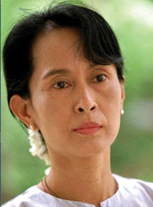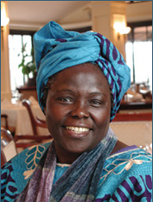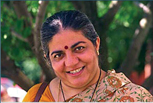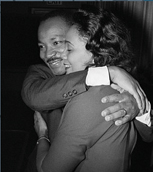Argentina
Mothers of the Disappeared
Many outspoken citizens who resisted the dictatorship during the brutal 1976 military coup disappeared
at the hands of the army. Since April 1977 mothers, grandmothers, wives, daughters, and sisters walked
every week in a slow-moving circle around a central plaza while carrying pictures of their disappeared and
demanding an investigation. Although the women faced harsh political repression, they continued to pressure
their government. The Mothers of the Plaza inspired other mothers in El Salvador and Guatemala and helped initiate
democracy in Argentina in 1993.
Burma
Aung San Suu Kyi (1945- )
Suu Kyi was a leading
force behind the free elections in
Burma in May 1990. She played
a pivotal role in forming the National League for Democracy, which employed techniques of
nonviolence and civil disobedience to stop the military party from manipulating the elections.
Germany
Rosenstrasse Prison Demonstration
In February 1943, the Gestapo arrested the remaining Jews, mostly men who were married to
Aryan women in Germany. For the first time while under Nazi control, thousands of women congregated in
front of the Rosenstrasse detention center demanding the release of their husbands. In a few days,
the men were released. The Gestapo soldiers were dissuaded by the courage of the nonviolent protestors.
The demonstration of people power against the Nazis shows the potential for nonviolent persuasion.
Sophie Scholl (1925-1943)
In 1942, Scholl joined her brother’s political group, The White Rose, which was disgusted at Hitler and the Third Reich. The group distributed “Leaflets of the White Rose,” criticizing Germans who sat idly during the third Reich, and suggesting “passive resistance” as the best way to encourage the downfall of the government. Scholl, her brother, and friend were arrested and executed for their outright dissent.
Guatemala
Rigoberta Menchu (1959- )
Born in Guatemala, Rigoberta Menchu is a member of the Quiche branch of the Mayan culture. Menchu became involved in the church and liberation theology, but as tensions grew in the country Menchu, her family, and her village were threatened, oppressed, and tortured by the military. She has since dedicated her life to working for indigenous rights and ethno-cultural reconciliation in a time and country when many died for speaking out. For her efforts she has received a Nobel Peace Prize.
India
Arundhati Roy (1961- )
First acknowledged internationally as a writer, Roy is actively gaining respect as an activist. Her campaign supports the Indian poor and provides a voice towards progressive social change. She is the first woman to win the Booker Prize for her novel The God of Small Things and the Sidney Peace Prize (2004) for her nonviolent activism.
Dr. Vandana Shiva (1925- ) [On this issue’s cover]
Shiva wears many hats as a physicist, ecologist, activist, editor, and author. She established Navdanya, the movement for biodiversity conservation and farmers’ rights. She has once said, “We have managed to make the celebration of diversity our mode of resistance.”
Israel
Machsom (Checkpoint) Watch
Machsom Watch is a
womens’ organization founded in
2001 in response to repeated
violations of Palestinian human
rights at Israeli army
checkpoints. The goals of the group are manifold: first, they seek to monitor the behavior of soldiers at checkpoints; second, to ensure that the human and civil rights of Palestinians are protected; and thirdly to record and report the results of their observations both to officials and the public. Currently, Machsom Watch boasts four hundred female activists who issue reports from two hundred Israeli checkpoints twice daily.
Women in Black
Now a worldwide movement with its beginnings in Israel, Women in Black is dedicated to nonviolent conflict resolution. It is estimated that there are about 10,000 members from all parts of the world dedicated to varying nonviolent practices that challenge the destructiveness of violence, whether direct or indirect.
Kenya
Wangari Maathai (1940- )
Maathai founded the
Green Belt Movement in Kenya
in 1977, which has planted more
than ten million trees to prevent
soil erosion and provide fire
wood for cooking fires. The
movement has also been monumental in combating serious problems such as deforestation, water pollution, soil runoff, firewood scarcity, and damage to animal ecosystems. For her irreplaceable efforts she received the Nobel Peace Prize (2004). After several defeats for the presidency and parliament, Maathai was elected to parliament in 2002, in which she continues to be an advocate for sustainable development and the environment.
Pakistan
Mukhtar Mai (1970- )
After a brutal gang rape, Mukhtar Mai did not commit suicide as culturally expected. Instead, she used her experience constructively to bring attention to this heinous assault on human dignity. She has raised money through NGOs, which has been used to improve schools in her village. “Education can change people through the awareness of their rights and duties,” she explains. “We must improve the minds of the boys and girls if we’re to improve women’s rights.”
Palestine
Rachel Corrie (1979-2003)
Corrie was an American member of the International Solidarity Movement during the Al-Aqsa Intifada. She was killed in Rafah while she tried to prevent an Israeli Caterpillar D9 bulldozer from demolishing a Palestinian home. Rachel described her feeling on the issue: “The fact [is] that I am in the midst of a genocide which I am also indirectly supporting, and for which my government is largely responsible…I think it is a good idea for us all to drop everything and devote our lives to making this stop.”
Philippines
Corazon (Cory) Cojuangco Aquino (1933- )
Aquino is the leader of the nonviolent People Power Movement in the Philippines, which brought the downfall of Marcos’ dictatorship in 1986. Once in power, Cory built her country as a democracy. To date, she has received international awards such as the Eleanor Roosevelt Human Rights Award and the United Nations Silver Medal. Cory was also cited for exemplifying a nonviolent movement for democracy, which later was tested in Burma, South Africa, Poland and Chile.
USA
Ella Baker (1903-1986)
During the student sit-ins in the 1960s, Baker organized the meeting out of which the Student Non-Violent Coordinating Committee (SNCC) arose as a leading force in the Civil Rights Movement. Baker also helped organize the Freedom Riders and the Mississippi Freedom Democratic campaigns. Her philosophy of action emphasized the development of democratic and grassroots participation and leadership in local communities where the people themselves shape their lives.
Dolores Huerta (1930- )
Along with Cesar Chavez, Huerta co-founded the United Farm Workers, a leading organization in the California Chicano Movement. She was essential in organizing and supporting the Delano Grape Strike of 1965, in which farmers demanded labor rights through nonviolent means. A year later, she led negotiations that secured labor rights for a committee comprised entirely of farm workers. In 1984, the California State Senate honored her with the Outstanding Labor Leader Award and in 1993 she was inducted into the National Women’s Hall of Fame.
Coretta Scott King (1927-2006)
Reputable as the widow of Rev. Dr.
Martin Luther King, Jr., Coretta dedi-
cated her life to the continuance of his life’s work in nonviolence, peace, and social justice. Among her many
achievements is the creation of the Martin Luther King, Jr. Center for Nonviolence and Social Change in Atlanta, Georgia. The Center was established to combat those issues she believed to lead to violence such as poverty, disenfranchisement, unemployment, racism, and attacks on affirmative action.
Rosa Parks (1913-2005)
Parks launched the Montgomery Bus Boycott and the Civil Rights Movement when she refused to give up her seat to a white passenger on a segregated bus in December 1955. She was arrested and fined, but her act of defiance began a movement that ended legal segregation in America. Her legacy teaches us the depth of nonviolence and the urgency with which we must use “the greatest power humans have been endowed with” (in the words of Gandhi) to realize justice and equality.


 Arundhati Roy
Arundhati Roy 


